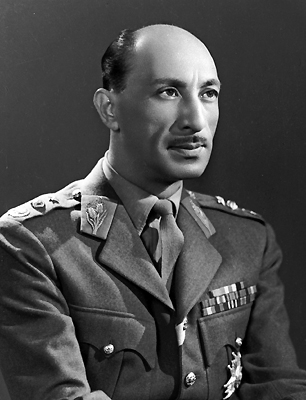
Mohammad Zahir Shah was the last King of Afghanistan, reigning from 8 November 1933 until he was deposed on 17 July 1973. Serving for 40 years, Zahir was the longest-serving ruler of Afghanistan since the foundation of the Durrani Empire in the 18th century.

Mohammad Daoud Khan, also romanized as Daud Khan or Dawood Khan, was an Afghan politician who served as prime minister of Afghanistan from 1953 to 1963 and, as leader of the 1973 Afghan coup d'état which overthrew the monarchy, served as the first president of Afghanistan from 1973 until his assassination in the Saur Revolution.
The following lists events that happened during 1991 in Afghanistan.

Mohammad Hashim Maiwandwal was an Afghan politician during the reign of Zahir Shah.

Parcham was the more moderate socialist faction of the People's Democratic Party of Afghanistan (PDPA) led by Babrak Karmal. It was later turned into the Watan (Homeland) Party with a more Islamic outlook under Mohammed Najibullah. The faction was formed directly after the founding of the Party in 1965 following ideological splits in the PDPA. While the Parchamites' stressed the need for swift social-economic reforms to achieve revolution, this was in direct contrast with their PDPA rivals, the Khalqists, who sought an immediate and violent overthrow of the government. Karmal believed that Afghanistan was not developed enough for a Leninist revolutionary approach and instead sought a patriotic and anti-imperialist united front to take the next steps toward revolution.
The following lists events that happened during 1963 in Afghanistan.
The following lists events that happened during 1964 in Afghanistan.
The following lists events that happened during 1965 in Afghanistan.
The following lists events that happened during 1967 in Afghanistan.
The following lists events that happened during 1969 in Afghanistan.
The following lists events that happened during 1970 in Afghanistan.
The following lists events that happened during 1973 in Afghanistan.
Habibia High School is a school in Kabul, Afghanistan which has educated many of the former and current Afghan elite, including former Presidents Ashraf Ghani and Hamid Karzai, as well as musician Ahmad Zahir. It was founded by King Habibullah Khan in 1903 and is considered one of the oldest Schools In Afghanistan. It is situated in the south of the city in a district known as Karteh Seh.
General Mohammed Asif Safi was an Army General in the Afghan National Army during King Zahir Shah's rule in Afghanistan, and later during the 1970s era of President Mohammed Daoud Khan.

The Republic of Afghanistan was the first republic in Afghanistan. It is often called the Daoud Republic or the Jamhuriyye-Sardaran, as it was established in July 1973 after General Sardar Mohammad Daoud Khan of the Barakzai dynasty alongside senior Barakzai Princes deposed his cousin, King Mohammad Zahir Shah, in a coup d'état. The occcasion for the coup was the 1964 Constitution of Afghanistan, that took power from most members of the royal family, in favour of the centralization under Zahir Shah and his offspring under the tenet of democracy. Daoud Khan was known for his autocracy and attempts to modernize the country with help from both the Soviet Union and the United States, among others.

The 1964 Constitution of Afghanistan was the supreme law of the Kingdom of Afghanistan from 1964 to 1973, when it was annulled following a coup d'état though parts of the constitution were restored by future governments from 2002 to 2004 and from 2021 to 2022. It was drafted by a committee of foreign-educated Afghans, including Sardar Abdul Hakim Ziai and Sardar Abdul Rahim Ziai, appointed for the task by the Afghan King, Mohammad Zahir Shah. The primary goals of the Constitution were to prepare the government and the people for gradual movement toward democracy and socioeconomic modernization. A Loya jirga had debated, modified and approved its innovations, which included a bill of rights for all Afghans, explicitly including women. After public review, the constitution was put into effect in October 1964.

The 1973 Afghan coup d'état, also called by Afghans as the Coup of 26 Saratan and self-proclaimed as the Revolution of 26 Saratan 1352, was led by Army General and prince Mohammad Daoud Khan against his cousin, King Mohammad Zahir Shah, on 17 July 1973, which resulted in the establishment of the Republic of Afghanistan under a one-party system led by Daoud Khan.
Kubra Noorzai (1932–1986) was an Afghan politician. She was the first woman to become a government minister in the country, serving as Minister of Public Health between 1965 and 1969.
Constitutional Assembly elections were held in Afghanistan in 1964. The Assembly produced the 1964 constitution, which introduced women's suffrage.







